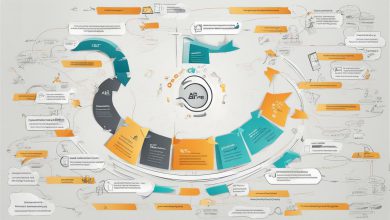
As a leader, it’s important to understand the pillars or key elements necessary for successful team leadership. Whether you’re managing a large corporation or a small team, enhancing team management skills, fostering effective communication, promoting teamwork, and developing leadership strategies to increase team productivity will help build a cohesive unit.
Team management involves knowing your team’s strengths and weaknesses, delegating tasks effectively, and providing support where necessary. Effective communication is vital in establishing clear expectations, sharing feedback, and addressing any potential conflicts in a timely manner. Teamwork is essential for creating a culture of collaboration and mutual respect, where every member feels valued and supported.
Developing leadership skills is a crucial aspect of effective team leadership. It involves continuous learning, self-awareness, and emotional intelligence. Leaders must also foster a culture of trust and transparency. This includes providing a supportive work environment where team members feel encouraged to take ownership of their work and grow within the team.
Finally, successful team leadership involves implementing leadership strategies that can enhance team productivity. This can be achieved by setting clear goals, providing performance feedback, and empowering team members to take ownership of their work.
Key Takeaways:
- Successful team leadership involves enhancing team management skills, fostering effective communication, promoting teamwork, and developing leadership strategies to increase team productivity.
- Leaders must continuously learn and develop their emotional intelligence skills to create a supportive work environment where team members feel valued and encouraged to take ownership of their work.
- Implementing leadership strategies that set clear goals, provide performance feedback, and empower team members can enhance team productivity.
The Importance of Effective Communication in Team Leadership
Effective communication is a vital element of successful team leadership. It plays a significant role in creating a cohesive unit and boosting team productivity. When team members understand each other’s ideas and goals, it helps in building trust and respect, which is crucial for effective communication.
As a team leader, you need to be clear in your instructions, provide constructive feedback, and encourage active listening to foster effective communication in your team. It is important to ensure that all team members understand their roles and responsibilities, and are clear about the expectations and goals of the team.
Effective communication also involves being open and transparent with your team members. Encourage them to express their thoughts and opinions without fear of judgement. This promotes a culture of inclusivity, where all team members are valued for their contributions and ideas.
Lastly, as a team leader, it is important to lead by example. Demonstrate effective communication skills in your interactions with your team members, and encourage them to do the same. This can go a long way in creating a harmonious and productive work environment.
Team Building and Collaboration: Strengthening the Unit
Building a cohesive team is crucial for any organization’s success, and team building and collaboration are two key components in achieving that. Fostering a sense of community and building trust among team members are essential in creating a united and cohesive team.
One effective team-building strategy is to organize team-building activities that promote communication, collaboration, and problem-solving. For instance, team-building exercises such as escape rooms and scavenger hunts can help team members think creatively and strengthen their problem-solving skills. Another effective way to cultivate teamwork is by assigning group projects. This allows team members to work closely together, learn from one another, and develop a sense of responsibility and accountability towards the project’s success.
Creating a collaborative work environment is equally important. Encouraging team members to listen to each other’s ideas, provide feedback, and work together on tasks fosters teamwork and collaboration. It is also essential to establish open communication channels that facilitate the exchange of ideas and opinions. Encouraging team members to speak up and share their thoughts and concerns creates an inclusive and transparent work environment that promotes collaboration and fosters a cohesive team.
In conclusion, team building and collaboration are vital components of building a cohesive team. Encouraging communication, promoting teamwork, and fostering a collaborative work environment are effective strategies that create a united and high-performing team.
Developing Leadership Skills: Nurturing Effective Leaders
Developing leadership skills is a critical aspect of effective team leadership. A good leader is someone who can inspire, motivate and guide his or her team members towards achieving their goals. A strong understanding of leadership skills and how to develop them can create a positive and productive work environment.
Continuous learning is essential in the evolution of leadership skills. Leaders must be able to adapt to changing situations and keep up with new trends and technologies. Self-awareness is also an important aspect of leadership development. A leader who understands his or her strengths and weaknesses can make better decisions and become more effective in leading a team.
Emotional intelligence is another crucial element of effective leadership. Leaders who are emotionally intelligent are better at understanding their team members’ emotions and needs, which can lead to higher levels of engagement and motivation.
Leadership development programs, mentoring, and coaching are all effective strategies for nurturing and enhancing leadership skills within a team. These programs can offer opportunities for leaders to learn and develop new skills, as well as gain feedback on their performance.
By investing in leadership development, organizations can create a culture of continuous improvement and growth. Nurturing effective leaders not only benefits the individuals but also improves the overall performance and productivity of the team.
Strategies for Enhancing Team Productivity
Effective leadership strategies can significantly improve team productivity. Here are a few strategies to consider:
- Set clear goals: Clearly defined goals help team members understand their assigned tasks and how to achieve them. Ensure that goals are specific, measurable, achievable, and time-bound (SMART).
- Provide regular feedback: Regular feedback allows team members to improve their performance and contributes to a positive work culture. Encourage open communication and offer constructive feedback to inspire growth.
- Empower team members: Empowering team members fosters a sense of ownership and accountability, which leads to increased productivity. Delegate tasks and allow team members to make decisions and take initiative.
- Promote a positive work culture: A positive work culture can go a long way towards building a cohesive team. Encourage open communication, recognize accomplishments, and create a supportive work environment.
- Encourage collaboration: Encouraging collaboration among team members promotes shared responsibility and increases productivity. Provide opportunities for team members to work together and share ideas.
By implementing these leadership strategies, you can enhance team productivity and create a more cohesive unit.
Conclusion
Effective team leadership is crucial for building a cohesive unit that works towards a common goal. By focusing on the pillars of team management, communication, teamwork, and leadership development, leaders can unlock leadership success and create a high-performing team.
Remember that effective communication is the backbone of team leadership. Encourage active listening, clarity of instructions, and constructive feedback to build trust and foster collaboration among team members. Don’t forget to invest in team-building activities and strategies to create a sense of community and strengthen your team bonds.
Developing your leadership skills is also essential to becoming an effective team leader. Invest in continuous learning, develop self-awareness and emotional intelligence, and seek out mentorship and leadership development programs to enhance your leadership skills.
Finally, focus on enhancing team productivity by setting clear goals, providing performance feedback, and empowering team members to take ownership of their work. By implementing these strategies, you can create a united, high-performing team that achieves its goals while practicing effective team leadership.
Take Action Now
Don’t wait to implement these strategies. Use the resources and insights provided in this article to develop effective team leadership, and start building a cohesive unit that delivers results today.
FAQ
Q: What is effective team leadership?
A: Effective team leadership refers to the ability to manage and lead a group of individuals towards a common goal or objective. It involves skills such as effective communication, fostering teamwork, and developing strategies to increase team productivity.
Q: Why is effective communication important in team leadership?
A: Effective communication is crucial in team leadership as it enables clear understanding, promotes collaboration, and establishes trust among team members. It involves active listening, providing clear instructions, and offering constructive feedback to ensure effective information exchange.
Q: How does team building and collaboration strengthen a unit?
A: Team building and collaboration play a vital role in creating a stronger and more cohesive team. By fostering a sense of community, building trust, and promoting a collaborative work environment, team members can work together more efficiently, enhance problem-solving abilities, and achieve better outcomes.
Q: How can leadership skills be developed?
A: Leadership skills can be nurtured through continuous learning, self-awareness, and emotional intelligence. Engaging in leadership development programs, seeking mentorship opportunities, and exploring various strategies can help individuals enhance their leadership abilities.
Q: What are some strategies for enhancing team productivity?
A: Some strategies for enhancing team productivity include setting clear goals, providing performance feedback, and empowering team members to take ownership of their work. Effective leadership strategies can inspire motivation, improve collaboration, and drive the team towards achieving higher levels of productivity.








